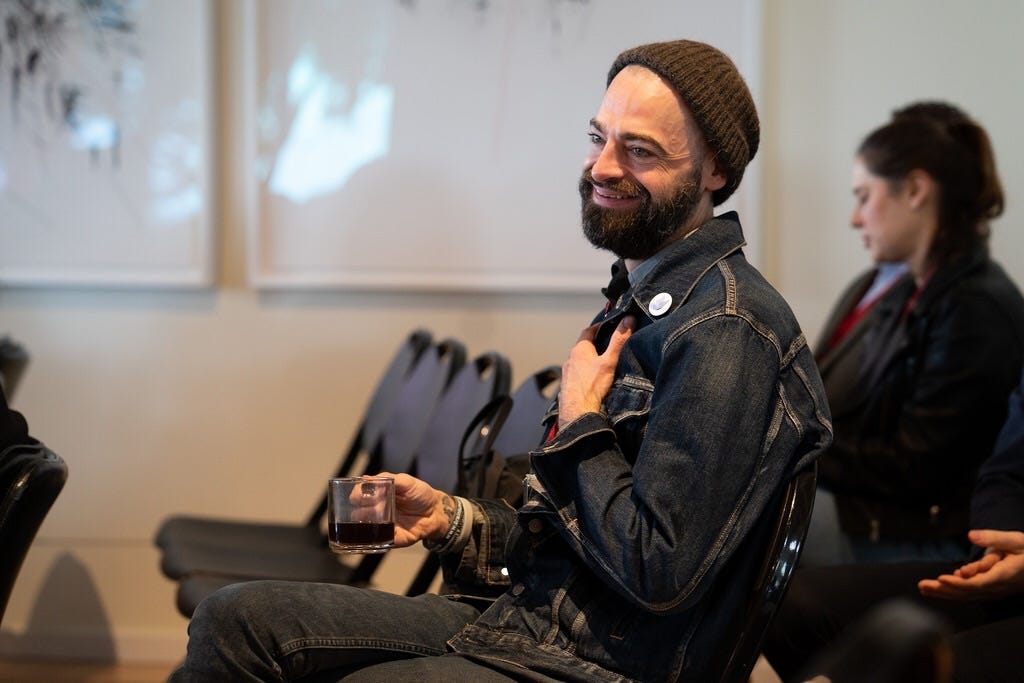“The American conversation, writ large, is missing an appreciation for what I call, ‘death talk.’ The outcome of death talk is that we reveal the life of a patient in robust ways through empathetic listening that promote the identification of patient values.”
In June 2016, I was diagnosed with the aggressive brain cancer, glioblastoma (GBM). Patients with GBM face the cytotoxic (i.e. cell-killing) cancer therapies common to many cancers, including chemotherapies and radiation therapy. These patients also face unique obstacles given their tumor’s residence in the brain.
Several neurological disorders accompany brain tumors, cancerous or not, including tumor-associated epilepsy (TAE), personality changes, migraines, motor and sensory impairment, visual impairment, memory problems, and neuro fatigue. All that to say that: GBM is a life-limiting disease. In the course of disease progression a patient steadily loses executive function. In the end stage, a patient loses ability to communicate beyond themselves.
A centerpiece of my personal identity is grounded in my ability to communicate effectively with others, through verbal communication, writing, and reading. The “me” who is not engaged with others through these avenues would not be an authentic representation of the values I hold close. Interventions taken to extend my life without benefit to maintaining the agency and identify of self would be incongruous with my definition of a “good death.”
The diagnosis of an advanced illness, the medical interventions ordered to palliate symptoms, and the settings in which practices of medicine are carried out risk moving the locus of control — a person’s belief that they may influence the outcome of events — outside the patient. Patients are often caught between protocols and policy, with little regard for a patient’s personal identity and their role in a plan of care. Telling our stories to each other, to our social circles of influence, and to our clinicians enables us, as patients, to locate our agency and make clear the values that matter most to us. In short, storytelling enables patients to recover a degree of their autonomy and restores their identity of a patient as a person, not only as a disease to treat.
Taking this ‘Oslerian imperative’ is especially important for patients with diseases for which available curative therapies are ineffective or not yet developed, as is often the case with advanced illness. Aligning agency with identity is integral to advance care planning where all members of a care team must actively work to close the gap between (medical) actions performed and (patient) values held. Any inconsistencies between actions and values may prohibit a “good death” — the goal of thoughtful end of life planning and care.
Reconstructing patient experiences through storytelling is an effective means of processing complicated emotions and establishing a supportive network of partners who endure the journey alongside us. Partners in care are supportive across a range of both acute needs — food preparation, dressing, toileting, and other activities of daily living — and psychosocial support, when our failing bodies present existential problems to confront questions of purpose, personal identity, legacy, and living (and dying) well.
The American conversation, writ large, is missing an appreciation for what I call, ‘death talk.’ Further, I worry that when death is discussed, we mistakenly identify the preparation of legal documents as a poor surrogate for the values-informed, narrative-driven death talk I have in mind. Confusion is raised when we combine legal documents, like the advance directive or physician orders for life-sustaining treatment (POLST), with the conversations held to produce them. Advance planning is most effective when initiated shortly after diagnosis and includes a sustained conversation about values, priorities, considerations for our loved ones, and desires for our final minutes (hours, days, or weeks).
My aim to bring death out of the shadows of taboo is not to ensure every American has an advance directive on file–though, that is not a bad result; rather, my espousal of end of life planning and care is to promote the dialogue pertaining to death.
The outcome of death talk is not only the preparation of documentation. The outcome of death talk is that we reveal the life of a patient in robust ways through empathetic listening that promote the identification of patient values. With a firm grasp on what matters most to this patient, the orders included in the legal documents reflect a tight actions-values alignment. It is the conversation that should be lifted up by advance care planning, not its products or outcomes.
My advance planning conversation began with my neurosurgeon during our first consultation when I stated plainly, “I am ready to spend my life in a wheelchair so long as I can read a book while doing so.” Though unrehearsed and without deliberation, this remark signals my subconscious desire to express values that continue to be shaped by ongoing conversations with my care team. In the two years following my diagnosis I celebrate this milestone of survivorship, and I recognize the opportunity to tell my story as an example of the sort of death talk we should embrace rather than fear.
Adam Hayden is a philosopher of science, a champion of narrative medicine, and a person living with brain cancer (glioblastoma). He serves on multiple national advisory councils and committees focused on patient engagement and advocacy and co-moderates a monthly social media chat for the brain tumor community.
You can follow along with Adam’s journey at @adamhayden.
